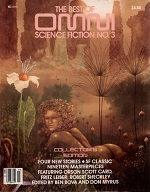Clap Hands and Sing
- by Orson Scott Card
- Short Story
- Fantasy, Horror
- Adults
- Definite Time Travel
- English
- “Clap Hands and Sing” by Orson Scott Card, in The Best of Omni Science Fiction No. 3, edited by Ben Bova and Don Myrus (Omni Publications International Ltd., February 1982).
Ancient Charlie sees a momentary vision of young Rachel, barely into her teens, and a moment with her that was never to be.
I’ve read other Card stories where he portrays the dark side of a character in realistic and frightening form that I could deal with, but for me, the seeming comfort that the character gets at the end is more disturbing than anything else Card has written.
I’ve read other Card stories where he portrays the dark side of a character in realistic and frightening form that I could deal with, but for me, the seeming comfort that the character gets at the end is more disturbing than anything else Card has written.
He almost stops himself. Few things are left in his private catalog of sin, but surely this is one. He looks into himself and tries to find the will to resist his own desire solely because its fulfillment will hurt another person. He is out of practice—so far out of practice that he keeps losing track of the reason for resisting.

Tags
(1)
- Groupings
Variants
(1)
- “Clap Hands and Sing” by Orson Scott Card, in The Best of Omni Science Fiction No. 3, edited by Ben Bova and Don Myrus (Omni Publications International Ltd., February 1982).
